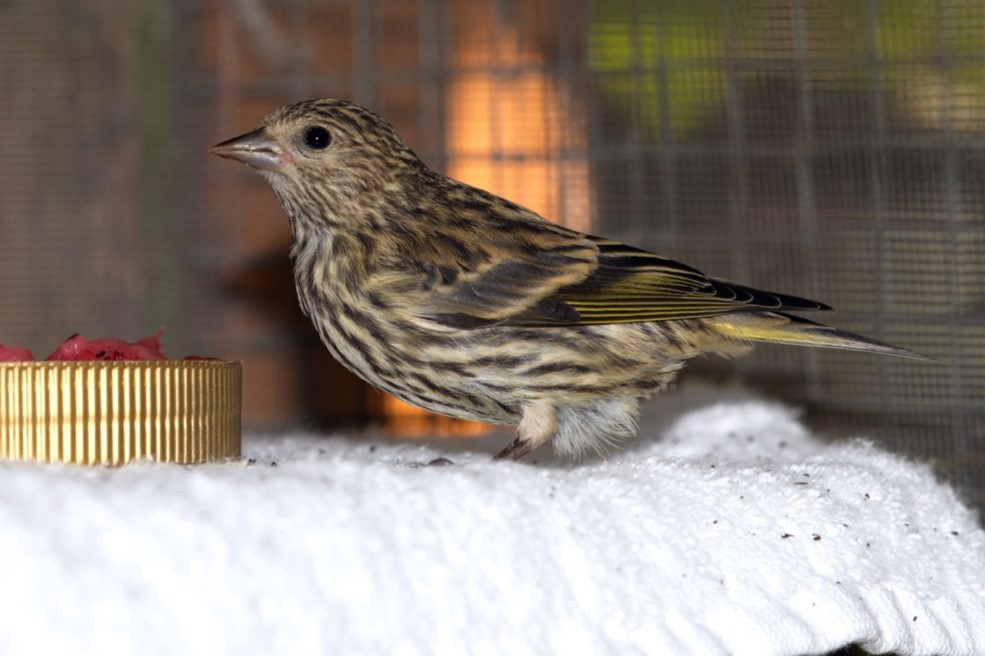Support Us
Since 1979 more than 140,000 animals have been treated by Wildlife Rescue.
Thanks to the support of individuals like you, Wildlife Rescue can provide a lifeline for animals in distress.

It is an irruptive year for Pine Siskins! Each Winter, these nomadic finches range widely and erratically across North America, their migrations heavily food driven. These past few months, dense flocks of siskins have been seen across the Pacific Northwest. It is believed that the staggering numbers of Pine Siskins are due to a shortage of food in the northern range of siskins in Canada’s boreal forest.
Birders may enjoy seeing these gregarious finches at their feeders, but it is vital to prevent these congregation spots from becoming a breeding ground for disease. Dense flocks are extremely vulnerable to disease outbreaks – when one gets sick, they all get sick. Sadly, that is exactly what Wildlife Rescue is currently seeing: many Pine Siskins have symptoms of Salmonella, and they need our help.
Increased reports of sick and dying birds have been noted across the Pacific Northwest, from Oregon to British Columbia.
Any bird can be impacted by salmonella, however, Pine Siskins seem to be most vulnerable. This is potentially due to their social nature, flocking and feeding in close association with each other making it easy for the disease to be passed from bird to bird.
Salmonellosis is an infection caused by bacteria of the genus Salmonella. These bacteria primarily attack the digestive system, notably the throat, making it difficult for the birds to feed. The symptoms are not always obvious in wild animals, but infected birds may appear thin, fluffed up, and lethargic.
It’s important to note, Salmonella is a zoonotic disease – it is highly communicable to humans as well as other animals, our companion animals included.
To prevent contamination, and as a good practice, always wash your hands thoroughly after handling bird feeders, or after touching a sick or dead bird.
If your pet ever comes in contact with a bird, monitor their behaviour closely for any signs of infection such as diarrhea, decreased appetite, and lethargy. If you ever have any concerns about their health, contact your veterinarian for advice.
Wildlife Rescue is seeing record-breaking numbers of birds displaying symptoms of Salmonella infection.
In 2020, 127 Pine Siskins were admitted, which is a 13-fold increase from what we saw in the last two years. In December alone, 75 Pine Siskins were admitted and suspected to be infected with Salmonella.
Since the New Year began, 36 Pine Siskins suspected of Salmonella poisoning have been brought in, and more are coming in every day. Each one exhibiting symptoms of salmonella, and some with secondary injuries caused because of this illness.
Wildlife Rescue’s Support Centre is also dealing with an influx of calls from the community regarding sick and dying birds. People are finding large numbers of these songbirds lethargic, and too weak to fly away, symptoms consistent with Salmonella poisoning.
Salmonellosis is primarily transmitted by fecal contamination of food and water by sick birds, although it can also be transmitted through bird-to-bird contact. High traffic spots, such as bird feeders, create a source point of transmission and can exacerbate the spread of this deadly disease. Removing the feeders completely is the best solution to encourage birds to disperse, thereby minimizing the potential for infection. If you choose to keep your feeders up, they must be properly maintained to foster a healthy bird environment.
If you are experiencing sick birds at your feeder: remove the feeder for at least 14 days so birds will disperse and are less likely to be exposed to the infection.
If you find a Pine Siskin, or any wildlife, showing signs of distress or illness, please contact our Support Centre for assistance.
If the bird was found near a feeder, it is important to take the feeder down for two weeks at minimum (longer if you are still seeing sick birds) and to thoroughly sanitize it. If possible, it is best to take feeders down until the flocks leave, mid to end of February.
It is vital to remove sick birds from the environment to prevent the ongoing spread of this deadly disease.
Songbirds need your support – keeping your feeders clean may just save lives.